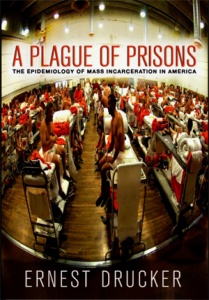This post is written by Ernie Drucker.
In my book A Plague of Prisons , The Epidemiology of Mass Incarceration in America (New Press, 2013) I proposed a public health model of mass incarceration, arguing that the war on drugs and its harsh sentencing policies ignited our epidemic of imprisonment. But the fact of the imprisonment of 10 million Americans in the last 40 years demands more than re-imagining the problem – it demands solutions.
The war on drugs fueled a “race to incarcerate”, deepening America’s racial and economic disparities , and drawing resources away from other vital social and health programs. The resulting criminalization and mass incarceration of three generations of young minority males has left a trail of mass trauma and imposed systematic disadvantages on this population – direct consequences of “toxic punishment” (Golash D. The Case Against Punishment: Retribution, Crime Prevention, and the Law. NYU. 2005). The vast “criminal industrial complex” that has been built upon mass punishment, is now rapidly commoditizing criminal justice through privatization , e.g. in halfway houses for re-entering prisoners and special schools for juveniles – with little accountability for outcomes or collateral consequences.
The politically powerful and highly institutionalized system of mass punishment has taken on a life of its own and will not easily give up the lifetime grip it maintains on the population of former prisoners, all the while continuing to confer severe disadvantages on successive generations in urban communities where they are concentrated – i.e. increased homicide and suicide rates , greater risks of their own children’s future imprisonment , higher infant mortality rates , and shortened life expectancies , lower rates of employment and wages , less education , more failed marriages , and lower voting participation , associated with near universal felony disenfranchisement.
With growing privatization of prisons , we can expect even less transparency and public accountability, as we extend criminalization and mass punishment to other areas of social conflict – immigration, race relations, sexuality – each of which now provides multiple opportunities for our “culture of punishment” to assert itself in new areas e.g. in 2012 over 500,000 “illegal” immigrants were held in detention centers and 400,000 deported; 500,000 sex offenders arrested , imprisoned, and placed on computerized registries .
A Watershed Moment
Fortunately we are now at a turning point in this struggle – one we must take advantage of . US Atty. General Eric Holder recently said that “too many Americans go to too many prisons for far too long, and for no truly good law enforcement reason.” This was an important first step toward a national recognition that our decades long war on drugs has been ineffective, expensive, and cruel. As bipartisan support grows in Congress for overhauling U.S. drug laws, Holder has ordered Federal prosecutors to remove any reference to quantities of illicit drugs that trigger mandatory minimums .
But it is only through re-thinking and challenging our fundamental ideas about punishment that we will find a way out of the shadow of this great crime against humanity that mass incarceration represents. The recent case of Trayvon Martin demonstrates the limitations of our criminal justice system – based as it is on narrow model of blame and punishment . But what are the alternatives to this ancient and almost universal trope that has now become the foundation of our system of justice in America? One vital step in that direction is challenging punishment itself , turning our attention to the social injustices that underlie both crime and punishment.
When viewed through a public health lens which views mass incarceration as a collective problem that require social solutions
I’m working on a new book challenging America’s “culture of punishment” within a pubic health model based on human rights and restorative justice principals and practices. Instead of relying, as it does now, despite lip service to ideas about rehabilitation based on “correctional” systems that are, in practice vast engines of cruel retribution – even torture . My new book will map the road to restorative justice through such challenges and how these new models can allow us to put an end to mass incarceration and heal the mass trauma it has left behind .
Three Key Steps to Move from Punishment to Public Health
To launch this process in America here are three steps we must take:
- Recognize the Toxicity of Punishment: Punishment can be a form of state violence and mass trauma, where pain and suffering are intentionally applied to human beings in the name of justice. Research shows that “toxic punishment” is “excessive or prolonged activation of stress response systems ( and has) damaging effects on learning, behavior, and health across the lifespan” (Harvard, Center on the Developing Child). [2] Mass incarceration is mass exposure to toxic stress. The public-health model and epidemiology of punishment , as a form of violence, allows us to examine the impacts of mass punishment and its health consequences (Velasquez-Manoff, “Status and Stress,” New York Times, Jul 27, 2013).
- Challenge Our Most Toxic Systems of Punishment: we need to recognize and end the most toxic forms of punishment that characterize our system of mass incarceration. This first means reducing the size of the problem, for it is the huge scale of incarceration that drives the significance of its impact on public health and casts a shadow over American life. We can do this by setting a goal of limiting the use of prisons as the default response to so many actions by so many people – with a goal of getting back to levels before the epidemic of mass incarceration began – a figure of 100/100,000 populations in line with that of other modern democracies . Challenging mass incarceration we can build on other successful campaigns against punishment in America : e.g. opposition to the death penalty and rolling back the Rockefeller drug Laws. A great place to start is with reining in the massive use of solitary confinement – the most prominent and most torturous of all methods use in modern incarceration – the US , with 5% of world population and 25% of its prisoners, America accounts for over 50% of those held in punitive isolation. We must take on and learn from these cases , examine their sustaining sources, organizations, and leadership. Publicize the ways in which we can reduce incarceration without compromising public safety and work to build public support for alternatives to punishment .
- Build New Systems Based on Public Health , Human Rights , and Restorative Justice: Restorative principals and models of conflict resolution based on human rights do not impose toxic punishment – they work to break the cycle of retributive violence by challenging the use of collective punishment as tools of state power, replacing them with public health methods and outcomes, and show that these better serve legitimate public concerns about public safety.
Positive changes in drug polices are gaining new momentum in the US , with more state undertaking marijuana’s legalization. But reducing the length and frequency of drug-related incarceration going forward, however welcome, wont do anything about the large population of drug users already stuck in our prisons and the post prison correctional control over the lives of millions more. Over 300,000 drug offenders are still serving out long terms under the now discredited mandatory sentencing policies. Most of these are young minority men with children, drawn from our poorest urban communities. We must consider ways to remove most prisoners from the strangle hold of the criminal justice system – an amnesty that would allow those who can do so to re-establish a useful place in our society and in those communities most affected by mass incarceration – restoring them to full citizenship – the most essential ingredient to human rights.
~ Ernie Drucker, PhD, is a Research Associate at John Jay College-CUNY and on the faculty of the Mailman School of Public Health.




